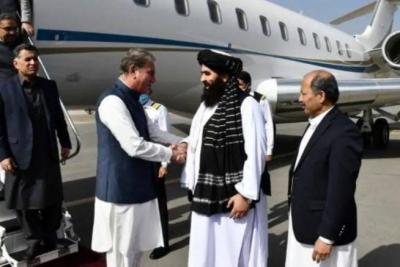On Thursday, Pakistani Foreign Minister Shah Mahmood Qureshi advised the new Taliban leaders in Kabul on how to obtain international recognition during a visit to the nearby capital. These high-level talks come as the Taliban face a new crisis more than nine weeks after taking power, following an explosion that caused a blackout in the capital, Kabul, which has a population of 4.6 million.
The Taliban overthrew the previous Afghan government, which was supported by the U.S., in mid-August and have since been seeking international support and funding for their regime. Pakistan is considered one of the most influential interlocutors for the Taliban and was one of the three countries that recognized its previous regime in 1996. However, relations between the two neighbors have been strained since the Taliban came to power in mid-August, especially regarding airlines and the opening of border crossings for people and goods.
After returning to Islamabad, Qureshi stated, "As a neighboring country and friend wishing them well, I informed them of the steps they could take to encourage their international acceptance." Qureshi, accompanied by the head of Pakistan's intelligence agency, mentioned that he met with Taliban government head Hassan Akhund and most members of the government during his visit to Kabul on Thursday. He explained that they discussed forming an inclusive government, respecting women’s rights, the need for girls’ education, and combating international terrorist organizations.
During a press conference, he said, "If they show some progress on these issues, the space for recognition will become easier for them," adding that "the environment is improving" for the recognition of the Taliban's regime. Before the meeting, the Taliban's position on adhering to international standards came under additional pressure when armed fighters from the group kicked and hit journalists covering a demonstration demanding women's rights. Around 20 women were allowed to protest in central Kabul for an hour and a half, but international journalists covering the march were subjected to beatings and insults. Two other journalists were also beaten, but no arrests were made. The women were demanding the right to work and education, which have been halted since the Taliban took over.
Pakistan was one of the three countries, along with Saudi Arabia and the UAE, that recognized the previous Taliban regime in the late 1990s, which was ousted from power by a U.S.-led international coalition in 2001. Taliban Foreign Minister Amir Khan Muttaqi commented in a video message, "We have great hope that all our trade problems will soon be resolved and that the borders will reopen," considering the meeting "very positive."
Recently, trucks carrying Afghan fruit have been left to rot at the southern border in Spin Boldak due to a dispute between the two countries over Pakistan tightening entry for Afghans into its territory. Qureshi stated that an easier entry visa system will be introduced for trade and for Afghans, thousands of whom cross daily between the two countries. He added that a Taliban delegation will soon make a follow-up visit to Pakistan.
Humanitarian crises have long been a point of contention, with the United States accusing Pakistan's intelligence agencies of supporting Islamist insurgents over two decades in their fight against NATO forces and the previous Afghan government backed by the West. Qureshi is the third foreign minister to visit Kabul since the Islamists took power, following the foreign ministers of Qatar and Uzbekistan. No country has yet recognized the Taliban regime.
On Wednesday, the Russian government hosted a delegation of senior Taliban officials in talks with envoys from ten countries, including China, Pakistan, and Iran. The economic crisis in Afghanistan and ways to counter attacks from the Islamic State organization were particularly discussed. Taliban Deputy Prime Minister Abdul Salam Hanafi once again called for the recognition of the regime, which would facilitate the lifting of sanctions, the release of Afghan assets, and the resumption of international aid that the country heavily relies on. He stated in Moscow, "Afghanistan's isolation is not in the interest of any party. This has been established before."
On Thursday evening, an explosion caused a blackout in Kabul, marking another setback for the Taliban's efforts to establish stability in Afghanistan after two months of holding power. The reasons for the explosion were not immediately clear, but if confirmed as an attack, it would add evidence that militants are resorting to the same tactics the Taliban used during their insurgency. The Afghan power company "Breshna" informed subscribers, "An explosion destroyed an electricity pole in the Qala-e-Murad Bek area in Kabul province, leading to the breakdown of a 220-kilovolt power line, and thus power was cut off from Kabul and some areas."
With the power outage occurring around 6:00 PM local time, Kabul, home to over 4.5 million residents, was plunged into darkness, prompting businesses and affluent neighborhoods to turn on private generators. During the 20-year conflict between the Taliban and the U.S.-backed Afghan government, fighters from the movement often targeted electricity infrastructure. However, since taking power in mid-August, the Taliban have begun facing attacks and deadly bombings carried out by Islamic State-affiliated militants.




